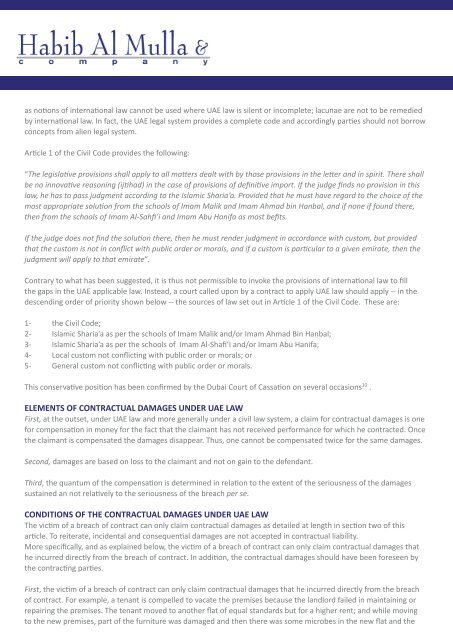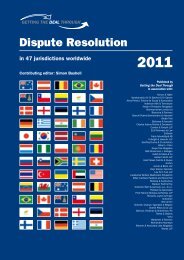Damages under UAE Law in the context of - Habib Al Mulla
Damages under UAE Law in the context of - Habib Al Mulla
Damages under UAE Law in the context of - Habib Al Mulla
Create successful ePaper yourself
Turn your PDF publications into a flip-book with our unique Google optimized e-Paper software.
as notions <strong>of</strong> <strong>in</strong>ternational law cannot be used where <strong>UAE</strong> law is silent or <strong>in</strong>complete; lacunae are not to be remedied<br />
by <strong>in</strong>ternational law. In fact, <strong>the</strong> <strong>UAE</strong> legal system provides a complete code and accord<strong>in</strong>gly parties should not borrow<br />
concepts from alien legal system.<br />
Article 1 <strong>of</strong> <strong>the</strong> Civil Code provides <strong>the</strong> follow<strong>in</strong>g:<br />
“The legislative provisions shall apply to all matters dealt with by those provisions <strong>in</strong> <strong>the</strong> letter and <strong>in</strong> spirit. There shall<br />
be no <strong>in</strong>novative reason<strong>in</strong>g (ijtihad) <strong>in</strong> <strong>the</strong> case <strong>of</strong> provisions <strong>of</strong> def<strong>in</strong>itive import. If <strong>the</strong> judge f<strong>in</strong>ds no provision <strong>in</strong> this<br />
law, he has to pass judgment accord<strong>in</strong>g to <strong>the</strong> Islamic Sharia’a. Provided that he must have regard to <strong>the</strong> choice <strong>of</strong> <strong>the</strong><br />
most appropriate solution from <strong>the</strong> schools <strong>of</strong> Imam Malik and Imam Ahmad b<strong>in</strong> Hanbal, and if none if found <strong>the</strong>re,<br />
<strong>the</strong>n from <strong>the</strong> schools <strong>of</strong> Imam <strong>Al</strong>-Sahfi’i and Imam Abu Hanifa as most befits.<br />
If <strong>the</strong> judge does not f<strong>in</strong>d <strong>the</strong> solution <strong>the</strong>re, <strong>the</strong>n he must render judgment <strong>in</strong> accordance with custom, but provided<br />
that <strong>the</strong> custom is not <strong>in</strong> conflict with public order or morals, and if a custom is particular to a given emirate, <strong>the</strong>n <strong>the</strong><br />
judgment will apply to that emirate”.<br />
Contrary to what has been suggested, it is thus not permissible to <strong>in</strong>voke <strong>the</strong> provisions <strong>of</strong> <strong>in</strong>ternational law to fill<br />
<strong>the</strong> gaps <strong>in</strong> <strong>the</strong> <strong>UAE</strong> applicable law. Instead, a court called upon by a contract to apply <strong>UAE</strong> law should apply -- <strong>in</strong> <strong>the</strong><br />
descend<strong>in</strong>g order <strong>of</strong> priority shown below -- <strong>the</strong> sources <strong>of</strong> law set out <strong>in</strong> Article 1 <strong>of</strong> <strong>the</strong> Civil Code. These are:<br />
1- <strong>the</strong> Civil Code;<br />
2- Islamic Sharia’a as per <strong>the</strong> schools <strong>of</strong> Imam Malik and/or Imam Ahmad B<strong>in</strong> Hanbal;<br />
3- Islamic Sharia’a as per <strong>the</strong> schools <strong>of</strong> Imam <strong>Al</strong>-Shafi’I and/or Imam Abu Hanifa;<br />
4- Local custom not conflict<strong>in</strong>g with public order or morals; or<br />
5- General custom not conflict<strong>in</strong>g with public order or morals.<br />
This conservative position has been confirmed by <strong>the</strong> Dubai Court <strong>of</strong> Cassation on several occasions 10 .<br />
ELEMENTS OF CONTRACTUAL DAMAGES UNDER <strong>UAE</strong> LAW<br />
First, at <strong>the</strong> outset, <strong>under</strong> <strong>UAE</strong> law and more generally <strong>under</strong> a civil law system, a claim for contractual damages is one<br />
for compensation <strong>in</strong> money for <strong>the</strong> fact that <strong>the</strong> claimant has not received performance for which he contracted. Once<br />
<strong>the</strong> claimant is compensated <strong>the</strong> damages disappear. Thus, one cannot be compensated twice for <strong>the</strong> same damages.<br />
Second, damages are based on loss to <strong>the</strong> claimant and not on ga<strong>in</strong> to <strong>the</strong> defendant.<br />
Third, <strong>the</strong> quantum <strong>of</strong> <strong>the</strong> compensation is determ<strong>in</strong>ed <strong>in</strong> relation to <strong>the</strong> extent <strong>of</strong> <strong>the</strong> seriousness <strong>of</strong> <strong>the</strong> damages<br />
susta<strong>in</strong>ed an not relatively to <strong>the</strong> seriousness <strong>of</strong> <strong>the</strong> breach per se.<br />
CONDITIONS OF THE CONTRACTUAL DAMAGES UNDER <strong>UAE</strong> LAW<br />
The victim <strong>of</strong> a breach <strong>of</strong> contract can only claim contractual damages as detailed at length <strong>in</strong> section two <strong>of</strong> this<br />
article. To reiterate, <strong>in</strong>cidental and consequential damages are not accepted <strong>in</strong> contractual liability.<br />
More specifically, and as expla<strong>in</strong>ed below, <strong>the</strong> victim <strong>of</strong> a breach <strong>of</strong> contract can only claim contractual damages that<br />
he <strong>in</strong>curred directly from <strong>the</strong> breach <strong>of</strong> contract. In addition, <strong>the</strong> contractual damages should have been foreseen by<br />
<strong>the</strong> contract<strong>in</strong>g parties.<br />
First, <strong>the</strong> victim <strong>of</strong> a breach <strong>of</strong> contract can only claim contractual damages that he <strong>in</strong>curred directly from <strong>the</strong> breach<br />
<strong>of</strong> contract. For example, a tenant is compelled to vacate <strong>the</strong> premises because <strong>the</strong> landlord failed <strong>in</strong> ma<strong>in</strong>ta<strong>in</strong><strong>in</strong>g or<br />
repair<strong>in</strong>g <strong>the</strong> premises. The tenant moved to ano<strong>the</strong>r flat <strong>of</strong> equal standards but for a higher rent; and while mov<strong>in</strong>g<br />
to <strong>the</strong> new premises, part <strong>of</strong> <strong>the</strong> furniture was damaged and <strong>the</strong>n <strong>the</strong>re was some microbes <strong>in</strong> <strong>the</strong> new flat and <strong>the</strong>



